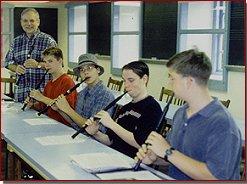
The first step in piping is to aquire a good practice chanter.
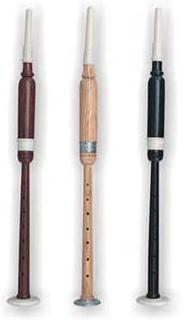
DO NOT buy these chanters!!!
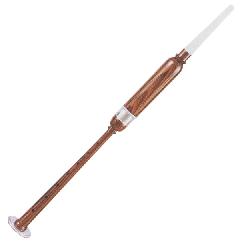
Chanters like this one made from rosewood are usually poor quality and not worth the purchase.
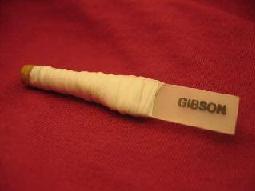
Practice chanters require plastic reeds like this one (NOT WOODEN REEDS).
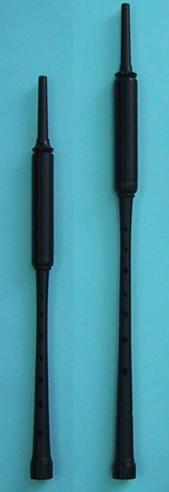
The long chanter is several inches longer than the standard sized providing good finger spacing ... and also has a better resonance.
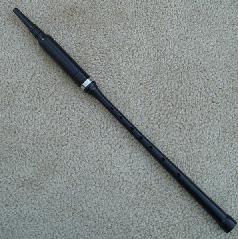
A good practice chanter is made of a durable black plastic that won't warp in dry conditions.
|
|
 |
Bagpipes ~
My advice to beginners...
Let me start with this bit of advice... DON'T GO OUT AND BUY A SET OF BAGPIPES YET!
The first step will be to buy a PRACTICE CHANTER w/ reeds. Once you have your practice chanter and plastic reeds, you'll want to get with your instructor. He'll teach you the basics and steer you in the right direction when it's time to purchase a set of bagpipes.
Given that bit of advice, many beginning students (or their parents) are so excited at the idea of learning bagpipes that they rush out and buy the first (or least expensive) practice chanter that they can find. They may buy it from a local music shop, eBay, a vendor at the fair, from an importer or a piping supply shop.
Chanters such as these are often made in Pakistan and are generally of very poor quality. They may look attractive, with their shiny bits of metal and high-gloss finish, but they are trouble! You may already have one of these in your posession. If you do, consider it a lesson learned and then go out and purchase a quality instrument.
The purpose of this article is not to make anyone feel bad for buying a cheap practice chanter - but to explain the problems of learning on a practice chanter such as this, and how to instead choose a high-quality instrument that will give you years of playing enjoyment.
Attempting to learn or play music on an instrument of poor quality is a dead-end. Any instrumentalist will agree that when you play on a quality instrument, life is great. When you play on a bad instrument, life can seem very hard indeed.
Why avoid a low-quality practice chanter?
There are 3 good reasons...
---1---Ear Training - ear training is a process by which a musician learns when her instrument is either in or out of tune. Teaching your ear the correct and 'true' bagpipe scale right from the beginning is a huge advantage. If you learn on an instrument that is chronically out of tune, your ear will become accustomed to that incorrect sound. Consequently, learning to hear correct tuning is made more difficult. Bagpipes are in constant need of tuning and training your ear to hear the slightest deviations in pitch and tone is essential, right from the beginning.
---2---Hole Size and Placement - Many poorly designed practice chanters (and many of those that are over 20 years old) have holes which are flat to the chanter, making proper finger placement difficult to learn. Most quality practice chanters these days have finger holes that are 'countersunk' or recessed, and placed in such a way as to closely resemble the hole spacing of a bagpipe chanter.
Beginners often have trouble finding and covering the holes completely. Recessed holes are much easier to feel and will cut down on the frustration caused by fingers slipping and making strange noises.
---3---Frustration - the bagpipe is a demanding and exacting instrument. The technique required to execute bagpipe fingerings and embellishments is considerable. Trying to make good music on a bad instrument is a maddening experience and frustration with a poor chanter may cause someone to just plain give up. Even an accomplished player would have a hard time producing a decent sound on a low quality practice chanter.
Countless times I have switched chanters with a student and watched their eyes go wide with amazement at how easy and enjoyable my practice chanter is to play compared to theirs. Sometimes that is all it takes to convince someone that they really do need to get a new chanter.
Practice Chanter Reeds
The most important part of any woodwind instrument is its reed. The practice chanter is no different. There are many quality practice chanter reeds on the market today and it is well worth the eight dollars to choose one of these reeds.
It's best, in my opinion, to get a reed from the maker of your chanter... thus a Gibson reed works best in a Gibson chanter... etc... I also have had good luck with Abbott reeds.
The reeds that go into your practice chanter will be plastic (not wooden).
Long Practice Chanters
Long (or full-sized) practice chanters have often been considered a step-up from regular chanters. You can distinguish a full-size chanter by its length - usually several inches longer than a regular standard-sized chanter.
I recommend the long chanter for my students as it resonates nicely and doesn't cost all that much more than the standard sized.
Practice chanters I recommend...
One chanter I recommend is the Gibson "Long" chanter. It has beautiful tone, nicely spaced, countersunk holes and I have had nothing but good results with it.
For photos and description, visit www.thepipershut.com When ordering, be sure to mention you would like the "LONG" practice chanter - Item c-pc-giblongplain. They run about $100 (April 2020) and are worth the investment.
Other reputable brands of chanters are McCallum, Naill, Dunbar, Walsh and Kron. There are probably others I am missing here, but these makers are known to produce good quality chanters.
In conclusion...
Bagpipes are an ancient and beautiful Celtic instrument. They are also said to be one of the most difficult to learn and to play. The practice chanter is your first step on the road to learning the pipes. Shouldn't that first step be made in a comfortable and well-made shoe?
Pick the right tool for the job.
I believe that the move from the practice chanter to the bagpipes should be as comfortable as possible. If you are even the least bit serious about learning to play the Great Highland Bagpipes, do not buy a poor quality practice chanter. You will save yourself much frustration.
If you take lessons from me, we'll be using the Scottish National Piping Centre's
"The Highland Bagpipe Tutor Book"
with the BLUE cover. This is a great tutorial for beginners and can be purchased from Amazon or most online bagpipe supply stores for about $60 (April 2020).
Once you have your practice chanter and reeds in hand, feel free to contact me to set up your first lesson. Call me at (330)958-8049 or send to brian@akronpiper.com I serve the Northeast Ohio community and would be glad to hear from you.
|
|



